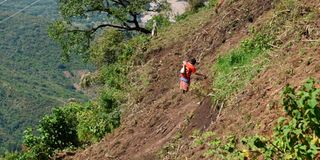Women's role on land committees reduced to 'decoration'

A woman at her farm on an escarpment at Kipchumwa Location in Elgeyo-Marakwet County on May 6, 2020. While women harness most land resources, systemic alienation and unwillingness to let go of the status quo has pushed them aside.
What you need to know:
- The Community Land Act allows communities to register, manage their communal lands, but meaningful inclusion of women in land governance remains a challenge.
- Despite provisions for equal representation, deep-rooted patriarchal norms often lead to tokenistic participation of women on land management committees.
A simple search on X, formerly Twitter, about “women and Community Land Act of 2016”, returns results such as “For a long time, women were side-lined in community land management; land rights, gender and agriculture governance in Kenya; or how is the Community Land Act gender transformative?”
So, what difference does this law bring in the push for equal and equitable access and use of land? I engage Isaac Tobiko, the executive chairperson of Community Land Action Now, to help answer this question.
His organisation directly works with indigenous peoples and local communities in Kenya to secure their rights over their communal lands.
Before 2016 when the Community Land Act came into force, communities had no opportunities to register land.
Now, the law allows a community to register land as a unit and elect between seven and 15 members to form a land management committee, which coordinates the development of land use plans.
These plans indicate areas the community would farm, settle, conserve or preserve cultural and heritage sites.
According to the Rights and Resources Initiative, by early 2021, fewer than 10 communities had registered their land with the government.
But there is a problem.
Sand harvesting
“We have not cracked the gender question in land ownership,” Mr Tobiko notes.
“Women should be meaningfully engaged and not involved just to tick the box.”
He says women are often included in the land management committees for “decoration”.
“If you ask the women included what the process is all about, they cannot explain it. If you look at the community land management committees, many women will be members but will not be officials, and even if they are, men will be doing their work,” he says.
He references one committee in which a woman was a treasurer but had no idea what her work was. And so, a man did her work, while she maintained the title.
Mr Tobiko attributes this discrimination to systemic alienation and unwillingness to let go of the status quo, yet women harness most land resources.
“If you look at the benefits men gain from community rangelands, you’ll realise that it’s just grazing and it ends there. When it comes to medicine, it is the women who get medicine from the land,” he says.
“The people who suffer the most when the community lands are mismanaged are the women. If there is so much sand harvesting, the water levels will go down and the women will have to walk long distances to fetch water. Because women suffer the most, they should be in charge of these resources.”
He says the community law provides women with opportunities to lead, control and manage natural resources.
“The law also disrupts the historical land question where women are not considered to inherit land. It gives them one indivisible share, and advances the equality question that everyone is equal, whether a man or woman. They also have equal voting rights.”
Chief Executive Officer Kenya Land Alliance Faith Alubbe, puts the government and land justice actors at the centre of realising meaningful participation of women in community land management.
“What we should do as land justice actors is ensure that women who are included in these committees indeed contribute and advance land justice because they understand the underlying principles,” she says.
Landesa Kenya land tenure specialist Rachel Dinda, for her part, says that “through systemic change” steered by the government and non-state actors, gears will change in favour of women.
She adds that they are currently engaging land sector actors in Kisumu, Kakamega and Kisii counties to promote equity and equality in land ownership.





